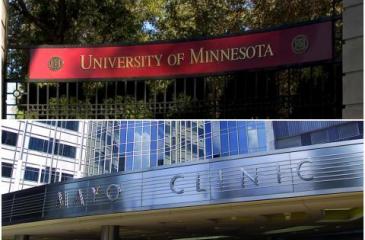Four research teams have been awarded up to $50,000 each to pursue health research projects that have the potential to lead to a start-up company or license agreement. If successful, the University of Minnesota and Mayo Clinic grantees will be eligible to apply for up to $400,000 in additional funding.
Awardees received funding through the Translational Product Development Fund (TPDF), which is in its fourth cycle of funding to support the development of novel therapeutic compounds, devices, diagnostics, or IT products with commercial potential.
The grant program is a collaboration between CTSI’s Office of Discovery and Translation and the Mayo Clinic Center for Clinical and Translational Science (CCaTS) in conjunction with the Minnesota Partnership for Biotechnology and Medical Genomics (MNP).
By translating research discoveries into new therapies and treatment approaches for patients, the Translational Product Development Fund aims to impact the lives of Minnesotans.
Congratulations to the newest awardees!
Intraganglionic Treatment for Chronic Locoregional Pain
Andreas Beutler, MD, Mayo Clinic, Rochester and James Collins, DVM, PhD, Department of Veterinary Population Medicine, College of Veterinary Medicine, University of Minnesota
Optimizing Infant Nutrition with Breastmilk Device
Arthur Erdman, PhD, Medical Devices Center, College of Science and Engineering, and Courtney Hill, MD, Medical Devices Center, Institute for Engineering in Medicine, University of Minnesota
Development of a Neonatal Esophageal Lengthening and Anastomotic Device
D. Dean Potter, MD, Dennis Wigle MD, PhD, and Stephanie Polites, MD, Mayo Clinic, Rochester
Treatment of Tension Pneumothorax Decompression with Needle Thoracostomy Colorimetric Capnography
Martin Zielinski, MD, and Jonathan M. Aho, MD, Mayo Clinic, Rochester
Proposals were evaluated based on clinical need/impact, project feasibility and expertise, and commercialization potential.
Funding for projects involving human research subjects is contingent on approval from the NIH's National Center for Advancing Translational Sciences.
